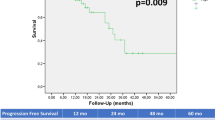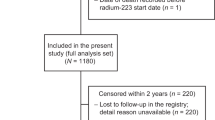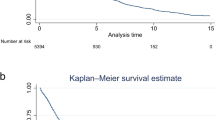Abstract
Background
The objective of this real-world population study is to investigate incidence and treatment of visceral metastases (VMs) in castration resistant prostate cancer (CRPC) patients and their survival.
Methods
CRPC-patients in the CAPRI-registry between 2010 and 2016 were included in the analyses and followed till 2017. Outcomes were proportion of patients radiologically screened for VMs and proportion of patients with VMs at CRPC-diagnosis and at the start of every treatment line. Groups have been created based on location of VMs (lung, liver, or both) at date of first VM diagnosis. The outcome for these groups was overall survival (OS). Statistics included descriptive analyses, Kaplan-Meier method, and Cox proportional hazard regression analysis for survival analyses.
Results
Of 3602 patients from the CAPRI registry, 457 patients (12.7%) were diagnosed with VMs during follow-up: 230 patients with liver, 161 with lung, and 66 with both liver and lung metastases. The proportion of patients radiologically screened for VMs increased per treatment line as did the occurrence rate of VMs. However, 80% of patients at CRPC diagnosis to 40% in the 6th line were not screened for VMs at the start of a systemic treatment. Median OS was 8.6 months for patients with liver, 18.3 with lung and 10.9 with both liver and lung metastases (p < 0.001) from date of first VM diagnosis. After correction for prognostic factors patients with lung metastases had significantly better OS than patients with liver metastases (HR 0.650, p = 0.001).
Conclusion
This real-world analysis showed that despite the increased rate of radiological staging during follow-up, still 80% to 40% of the patients (CRPC diagnosis to 6th treatment line respectively) were not screened for VMs at the start of a systemic treatment. VMs and location of VMs are key prognostic patient characteristics, impacts survival and have implications for treatment decisions, so routine staging of CRPC-patients is warranted.
Clinical trial identification
The CAPRI study is registered in the Dutch Trial Registry as NL3440 (NTR3591).
This is a preview of subscription content, access via your institution
Access options
Subscribe to this journal
Receive 4 print issues and online access
$259.00 per year
only $64.75 per issue
Buy this article
- Purchase on Springer Link
- Instant access to full article PDF
Prices may be subject to local taxes which are calculated during checkout



Similar content being viewed by others
Data availability
The datasets generated during and/or analysed during the current study are available from the corresponding author on reasonable request.
References
Cornford P, Bellmunt J, Bolla M, Briers E, De Santis M, Gross T, et al. EAU-ESTRO-SIOG guidelines on Prostate Cancer. Part II: treatment of relapsing, metastatic, and castration-resistant Prostate Cancer. Eur Urol. 2017;71:630–42.
Eisenberger M, Blumenstein B, Crawford E, Miller G, McLeod D, Loehrer P, et al. Bilateral orchiectomy with or without flutamide for metastatic Prostate Cancer. N. Engl J Med. 1998;339:1036–42.
Pezaro C, Omlin A, Lorente D, Nava Rodrigues D, Ferraldeschi R, Bianchini D, et al. Visceral disease in castration-resistant Prostate Cancer. Eur Urol. 2014;65:270–3.
Westgeest H, Uyl-de Groot C, van Moorselaar R, de Wit R, van den Bergh A, Coenen J, et al. Differences in trial and real-world populations in the Dutch Castration-resistant Prostate Cancer Registry. Eur Urol Focus. 2018;4:694–701.
Whitney C, Howard L, Posadas E, Amling C, Aronson W, Cooperberg M, et al. In men with castration-resistant Prostate Cancer, visceral metastases predict shorter overall survival: what predicts visceral metastases? Results from the SEARCH database. Eur Urol Focus. 2017;3:480–6.
Halabi S, Kelly W, Ma H, Zhou H, Solomon N, Fizazi K, et al. Meta-analysis evaluating the impact of site of metastasis on overall survival in men with Castration-Resistant Prostate Cancer. J Clin Oncol. 2016;34:1652–9.
van Dodewaard-de Jong J, Verheul H, Bloemendal H, de Klerk J, Carducci M, van den Eertwegh A. New treatment options for patients with metastatic Prostate Cancer: what is the optimal sequence? Clin Genitourin Cancer. 2015;13:271–9.
Hussain M, Mateo J, Fizazi K, Saad F, Shore N, Sandhu S, et al. Survival with olaparib in metastatic castration-resistant Prostate Cancer. N. Engl J Med. 2020;383:2345–57.
Annala M, Fu S, Bacon J, Sipola J, Iqbal N, Ferrario C, et al. Cabazitaxel versus abiraterone or enzalutamide in poor prognosis metastatic castration-resistant prostate cancer: a multicentre, randomised, open-label, phase II trial. Ann Oncol. 2021;32:896–905.
de Wit R, de Bono J, Sternberg C, Fizazi K, Tombal B, Wülfing C, et al. Cabazitaxel versus abiraterone or enzalutamide in metastatic Prostate Cancer. N. Engl J Med. 2019;381:2506–18.
Corn PG, Heath EI, Zurita A, Ramesh N, Xiao L, Sei E, et al. Cabazitaxel plus carboplatin for the treatment of men with metastatic castration-resistant prostate cancers: a randomised, open-label, phase 1–2 trial. Lancet Oncol. 2019;20:1432–43.
White I, Royston P, Wood A. Multiple imputation using chained equations: issues and guidance for practice. Stat Med. 2010;30:377–99.
Hanyok B, Howard L, Amling C, Aronson W, Cooperberg M, Kane C, et al. Is computed tomography a necessary part of a metastatic evaluation for castration-resistant prostate cancer? Results from the shared equal access Regional Cancer Hospital Database. Cancer. 2015;122:222–9.
Shenderov E, Velho P, Awan A, Mirkheshti N, Eisenberger M, Pardoll D, et al. Genomic characterization of pulmonary-metastatic prostate cancer: a unique molecular subtype. J Clin Oncol. 2019;37:210–10.
Alshalalfa M, Seldon C, Franco I, Vince R, Carmona R, Punnen S, et al. Clinicogenomic characterization of prostate cancer liver metastases. Prostate Cancer and Prostatic Dis. 2022;25:366–9.
Halabi S, Lin C, Kelly W, Fizazi K, Moul J, Kaplan E, et al. Updated prognostic model for predicting overall survival in first-line chemotherapy for patients with metastatic castration-resistant Prostate Cancer. J Clin Oncol. 2014;32:671–7.
Halabi S, Lin C, Small E, Armstrong A, Kaplan E, Petrylak D, et al. Prognostic model predicting metastatic castration-resistant Prostate Cancer survival in men treated with second-line chemotherapy. JNCI J Natl Cancer Inst. 2013;105:1729–37.
Funding
This research was funded by Sanofi-Aventis Netherlands B.V., Janssen-Cilag B.V., Astellas Pharma B.V., and Bayer B.V. The funding organizations had no role in the design and conduct of the study, collection, management, analysis, interpretation of the data, and preparation, review, or approval of the abstract.
Author information
Authors and Affiliations
Contributions
Study concept and design: GPAvdB and MCPK. Data analysis and/or interpretation: GPAvdB, MCPK, HMW, NM, WRG, KKHA, IMvO, RJAvM, DMS, AJMvdE, AMB, ACMvdB, CAUdG. Drafting of the manuscript: GPAvdB, MCPK, HMW, NM, WRG, ACMvdB, CAUdG. Critical revision and final approval of the manuscript: GPAvdB, MCPK, HMW, NM, WRG, KKHA, IMvO, RJAvM, DMS, AJMvdE, AMB, ACMvdB, CAUdG.
Corresponding authors
Ethics declarations
Competing interests
GPAvdB and MCPK report no conflict of interest. HMW reports travel expenses from Astellas and Ipsen; honoraria from Astellas and Roche. NM reports advisory role for Astellas, AstraZeneca, Janssen, JNJ, MSD, Pfizer, and Roche; funding (institutional and/or personal) from Astellas, Janssen and Pfizer; research grants (institutional) from AstraZeneca and BMS; coordinating PI (institutional) for BMS and Jansen; and non-financial interests (leadership-role or PI) in Castration-resistant Prostate Cancer Registry, Dutch Uro-Oncology Study Group and Prospective Bladder Cancer Infrastructure (Netherlands). WRG reports speaker fees (institutional and/or personal) from MSD; advisory role (institutional) for Bristol-Myers Squibb and Bayer; research grants (institutional) from Astellas, Bayer, Janssen-Cilag and MSD. KKHA reports no conflict of interest. IMvO reports conflicts of interest for Astellas, Bayer, Jansen, MSD/Astra and AAA Novartis. RJAvM reports conflicts of interest for Astellas, AstraZeneca, Bayer, Janssen, Pantarhei Oncology and Sanofi-Genzyme. DMS reports research grants/funding (institution) from Astellas, Besins and Dutch Cancer Society; Advisory/consultancy role for Astellas, Janssen, Bayer and MSD; contracted research (institution) for Janssen, Eli Lilly, Astellas, Blue Earth Diagnostics, Bayer, SPL medical and QED therapeutics. AJMvdE reports study grants from Sanofi, Roche, Bristol-Myers Squibb, TEVA and Idera; travel expenses from MSD Oncology, Roche, Pfizer and Sanofi; speaker honoraria from Bristol-Myers Squibb and Novartis; advisory role for Bristol-Myers Squibb, MSD Oncology, Amgen, Roche, Novartis, Sanofi, Pfizer, Ipsen, Merck and Pierre Fabre. AMB reports conflicts of interest for Astellas, Sanofi, Bayer and Janssen. ACMvdB and CAUdG report no conflict of interest.
Ethics approval and consent to participate
The authors state that they have obtained appropriate institutional review board approval or have followed the principles outlined in the Declaration of Helsinki for all human or animal experimental investigations.
Additional information
Publisher’s note Springer Nature remains neutral with regard to jurisdictional claims in published maps and institutional affiliations.
Supplementary information
Rights and permissions
Springer Nature or its licensor holds exclusive rights to this article under a publishing agreement with the author(s) or other rightsholder(s); author self-archiving of the accepted manuscript version of this article is solely governed by the terms of such publishing agreement and applicable law.
About this article
Cite this article
van den Bergh, G.P.A., Kuppen, M.C.P., Westgeest, H.M. et al. Incidence and survival of castration-resistant prostate cancer patients with visceral metastases: results from the Dutch CAPRI-registry. Prostate Cancer Prostatic Dis 26, 162–169 (2023). https://doi.org/10.1038/s41391-022-00605-7
Received:
Revised:
Accepted:
Published:
Issue Date:
DOI: https://doi.org/10.1038/s41391-022-00605-7
This article is cited by
-
From biology to the clinic — exploring liver metastasis in prostate cancer
Nature Reviews Urology (2024)
-
Screening of visceral metastasis in castration-resistant prostate cancer: a cornerstone in personalized patient’s care
Prostate Cancer and Prostatic Diseases (2023)
-
Therapeutic, diagnostic and prognostic values of TRIM proteins in prostate cancer
Pharmacological Reports (2023)



